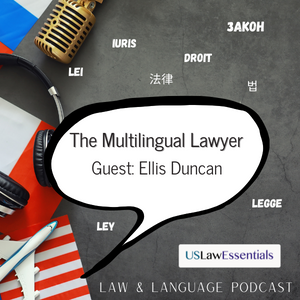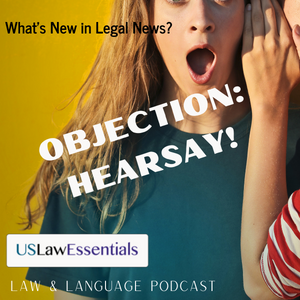Episode Transcript
Speaker 0 00:00:00 Welcome to the us law essentials law and language podcast, the legal English podcast for non-native English speakers that helps you improve your English, listening, improve your legal English vocabulary and build your knowledge of American legal culture.
Speaker 1 00:00:16 Before we begin today's episode, I wanted to remind you that us law central offers online legal English, and online us law courses. Our courses are designed for students bar exam candidates, attorneys, and translators. If you are interested in learning more, please contact Daniel, Daniel, us law, essentials.com or visit us law essentials.com and join us on LinkedIn and Facebook. And now today's episode. Hello and welcome to the us law essentials law and language podcast. I'm your host, Daniel Edelson
Speaker 2 00:00:58 And I'm Steven Horowitz.
Speaker 1 00:01:00 And this is our first episode of a new series. We're calling law school essentials, where we discuss a legal topic that is tested on us law school exams and us bar exams.
Speaker 2 00:01:12 So what are we talking about today, Dan?
Speaker 1 00:01:15 Yes. So today we're gonna be talking about sources of us contract law. That is where does us contract law.
Speaker 2 00:01:23 Ah, okay, so that's a good question. I think it mostly comes from state laws. Um, each state creates its own laws relating to contracts, right?
Speaker 1 00:01:36 Yeah, that's exactly right. So typically for purposes of us law school and the bar exam, you don't need to worry about federal law or the constitution when it comes to contract
Speaker 2 00:01:48 Law, but then law, when you say state law that can really mean sort of two different things. There's the laws that the legislature passes, um, you know, new laws that are created by, by elected representatives, but then, and in the us system, we've also got common law. That's the law that's created by, uh, court decisions.
Speaker 1 00:02:12 Right? Right. So one of the one key tip for any student who's writing an exam is to immediately distinguish whether or not they're a problem under the traditional common law rules or whether they're applying a statute. And if they are applying a statute in most states, what they're dealing with is something called the uniform commercial code.
Speaker 2 00:02:44 Um, let's see, uniform commercial code uniform means like same or standardized. Right,
Speaker 1 00:02:51 Right, right. So similar identical standardized. Yeah. Perfect.
Speaker 2 00:02:55 Okay. Commercial means it has to do with business or business transactions or, or buying and selling
Speaker 1 00:03:01 Right trade. Yep. You got it.
Speaker 2 00:03:03 Okay. And a code is a set of rules or, or laws or principles.
Speaker 1 00:03:09 And typically a, a code will be, uh, written, written laws statutes. So in this case, the uniform can, commercial code is an example of a model law. So, uh, what are some synonyms for model?
Speaker 2 00:03:27 Uh, an example.
Speaker 1 00:03:29 Yeah. Sample or example. So, so Steve, what do you think of when you think of a model law in the United States?
Speaker 2 00:03:36 Um, I think of a, of a bunch of legal experts sitting around and writing up a bunch of rules or, or something that looks like a law, but is not a law, but it's, it can be used by states that need a law on that topic. So it's like, rather than writing your own computer program to do something, you just buy the off the shelf, um, software like Microsoft word or something rather than write your own program.
Speaker 1 00:04:05 Yeah. <laugh>, that's, that's a good way of looking at it. So there's, there's a number of different model laws in the United States. There's the model penal code, which is an example of a criminal law. And states can choose to enact these laws that were written by experts. But the UCC, the uniform commercial code applies to contracts and it's been enormously successful. Virtually every state has enacted has passed the UCC for its own state almost in its entirety.
Speaker 2 00:04:39 So there might be slight variations from state to state, but basically they're all using the same version of the UCC.
Speaker 1 00:04:48 That's right. So in New York, there's something called the New York uniform commercial code in California. There's the California uniform commercial code. But you, you should expect that the New York UCC, the California C every other state's UCC will pretty much be the same.
Speaker 2 00:05:06 And so is the UCC used for all contracts.
Speaker 1 00:05:11 That's the tricky part. But another way to think about it is this is a way to score points on an exam. As a general rule, the UCC applies to contracts for the sale of goods and only to contracts for the sale of goods
Speaker 2 00:05:31 Goods. Let's see. Synonym challenge.
Speaker 1 00:05:34 What's a good, yeah. Here a synonym challenge. What's a good,
Speaker 2 00:05:37 A good is a thing.
Speaker 1 00:05:42 You got it. New other synonym, a good
Speaker 2 00:05:46 A baby. Maybe we have to, to think more in terms of examples, goods are computers. Goods are furniture. Goods are
Speaker 1 00:05:53 Television.
Speaker 2 00:05:54 Yeah. Bicycles, sewing machines, airplanes, cars,
Speaker 1 00:05:58 Trains.
Speaker 2 00:06:00 Um, what about podcasts are podcasts a good,
Speaker 1 00:06:05 Well, this happens to be a very good podcast. I dunno if the podcast itself is not a good, so, so, so the UCC itself defines a good as a tangible movable item. So if you have a contract where someone is buying and selling a tangible movable item, you would expect that the UCC should apply to that transaction
Speaker 2 00:06:37 And tangible means to something. You can touch something that's physical that can be touched and right. Um, and moveable means it it's really in contrast to real estate. Real estate is imovable right. So anything else other than land is moveable, cuz you can touch land, but you can't move land.
Speaker 1 00:06:59 Right. And things attached to the land. So, so real property, like a house is not considered a good for purposes of the UCC.
Speaker 2 00:07:07 Ah, but what about a mobile home?
Speaker 1 00:07:11 I knew you would say that. Well,
Speaker 2 00:07:12 We'll get to that later, I guess. Huh? That's where we get into the, I knew you would say that's the gray areas.
Speaker 1 00:07:18 Well that's not good. All right. But so, so a student taking a law school exam, one of the first things they're gonna do is look at the item and if it's an item that's being bought and sold and it's a tangible movable item, then the student will say, aha, the UCC should apply to this contract. All right. So Steve. Yeah. Are you ready? Are you ready? Okay. Let's say, let's say we have an insurance contract. Does the UCC apply to
Speaker 2 00:07:57 It? Oh man. Right on my first question, this is what you're giving me.
Speaker 1 00:08:01 This is what you're getting. Well, you, you brought up mobile home. So this is
Speaker 2 00:08:04 Your, I'm gonna say an insurance contract is not tangible and not movable. I mean, I guess the contract itself, if it's on paper is tangible. Although if it's a PDF and if it's a digital format, maybe it's not Steve. Steve,
Speaker 1 00:08:23 What
Speaker 2 00:08:24 Am I
Speaker 1 00:08:24 Going on? Steve? You're failing your contacts exam. Okay. Now, now one of the key things on a us law school exam is to stay focused. So if we have an insurance contract, is this a contract for, uh, buying and selling a tangible movable item? No, It is not. Therefore the you're gonna score a lot of points in this exam, Steve. Cause you're gonna start off by saying the UCC almost certainly does not to this contract.
Speaker 2 00:08:56 Okay. And then I'll deal with the rest of the problem. Uh, and then I'll deal with the rest of the exam question. But I, but then I've already figured out whether I'm gonna analyze this under UCC or under common law contract law.
Speaker 1 00:09:09 Yeah, exactly. And obviously this becomes important if, if the UCC has rules that are different from the common law, so you'll know, okay. The outcome will be different because I'm applying a different, a different law.
Speaker 2 00:09:29 Hmm. Yeah. So the exam questions are generally written to focus on or highlight some of the differences between UCC law and common law with regard to contracts.
Speaker 1 00:09:40 Yeah. That's that's it. That's all right. So, so Steve. Yeah. So from now on, if you ever take a law school exam again, Uhhuh <affirmative>, what's the first thing you're gonna do.
Speaker 2 00:09:52 First thing I'm gonna do is, is wake up because if I'm taking law school exam again, that means I'm dreaming. Uh
Speaker 1 00:09:59 Okay. <laugh>
Speaker 2 00:10:01 But after,
Speaker 1 00:10:02 Well maybe, maybe you would want to take a bar exam and get admitted to a different jurisdiction.
Speaker 2 00:10:07 Yes. Maybe I would wanna do that. <laugh> okay. So let's pretend I'm doing that
Speaker 1 00:10:11 And, and maybe you would wanna see a dentist too. Anything is possible.
Speaker 2 00:10:16 Anything is possible. Okay. So I'm gonna first, if I see anything about contract in the question, the first thing I'm gonna think about is this is, is this UCC or is this common law? And I'm gonna look for what the thing is and whether it's a tangible, movable item, like a TV or whether it's some sort of service like an insurance contract.
Speaker 1 00:10:36 Exactly. So if someone's buying an airplane, probably the UCC, if they're hiring a pilot, it's probably not the UCC.
Speaker 2 00:10:44 Oh, great example. Thanks. Okay. Well thanks Dan. You're welcome. This has been super helpful
Speaker 1 00:10:48 And thank you, Steve. I'm really glad that we did this first episode of the law school essential series and stay tuned for a future episodes where we discuss legal time topics, commonly tested on us law school exams and us bar exams. Steve stay essential,
Speaker 2 00:11:05 Stay essential.


